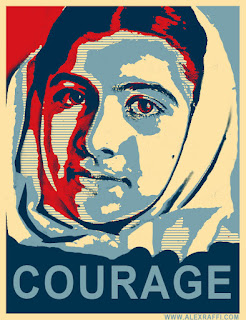This book helps to explain the drastic
changes that occurred when the Taliban came to power in Afghanistan in 1996. Set
in the backdrop of these true events, this story’s main focus is how the Taliban’s
rule affected women and girls. Following
their takeover, Afghani females were no longer allowed to attend school or
leave home without a male chaperone.
They had to cover their heads and bodies with a burqa.
Little Nasreen's pain is deeper still. Her parents mysteriously disappeared,
sadly a somewhat common occurrence under Taliban rule. Now,
the child refused to draw, sing, smile, even speak. Longing to help, Nasreen's wise grandmother hears of a secret school set up in defiance of the rigid Taliban prohibitions. Hoping to open her mind again to hope and purpose, the grandmother begins sending little Nasreen to the forbidden school. This education slowly opens her eyes to the beautiful world of art, literature, and history, thus beginning Nasreen's road to healing.
After reading this text, students were given the same opportunity that so enlightened little Nasreen - the opportunity to learn about the richness of unknown worlds. Students read about life in Afghanistan, looked at photos of its rich culture, beautiful landscape, and learned about its history. They also read about the rich tradition of Afghan kite making.
Finally, we read about the amazing life of Malala Yousafzai, a Pakistani activist for female education and, at 17, the youngest ever Nobel Prize recipient. Both through lived experience and through compelling advocacy, she connects national - and global - security with the availability of education.
Another article, which we discussed in depth, makes this same case. I offer the gist below:
In a nation of 170 million people – almost half of whom are under the age of 18 – only 50 per cent of Pakistani girls and 60 per cent of boys go to primary school, despite the fact that this schooling is entirely state funded. In this country which now boasts a nuclear arsenal, it's estimated that half of the population is probably unable to even write their names. Those unable to perform even this basic task are much easier to control and to be duped into accepting radical militant Islam.
Links:
http://www.telegraph.co.uk/news/worldnews/asia/pakistan/6503093/Lack-of-basic-education-fuels-rise-in-Taliban-and-extremism-in-Pakistan.html
http://mashable.com/2014/10/10/malala-nobel-moments/
http://www.afghanistan-culture.com/types-of-kites.html
http://www.nytimes.com/2003/07/27/world/after-the-war-the-librarian-books-spirited-to-safety-before-iraq-library-fire.html
http://en.m.wikipedia.org/wiki/Alia_Muhammad_Baker
http://www.buzzle.com/articles/the-great-library-of-alexandria.html
http://www.biography.com/people/malala-yousafzai-21362253#synopsis
http://www.malala.org/
http://mashable.com/2014/10/10/malala-nobel-moments/
http://www.afghanistan-culture.com/types-of-kites.html
http://www.nytimes.com/2003/07/27/world/after-the-war-the-librarian-books-spirited-to-safety-before-iraq-library-fire.html
http://en.m.wikipedia.org/wiki/Alia_Muhammad_Baker
http://www.buzzle.com/articles/the-great-library-of-alexandria.html
http://www.biography.com/people/malala-yousafzai-21362253#synopsis
http://www.malala.org/

No comments:
Post a Comment